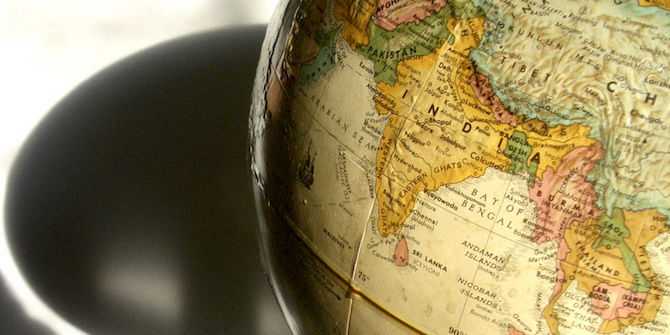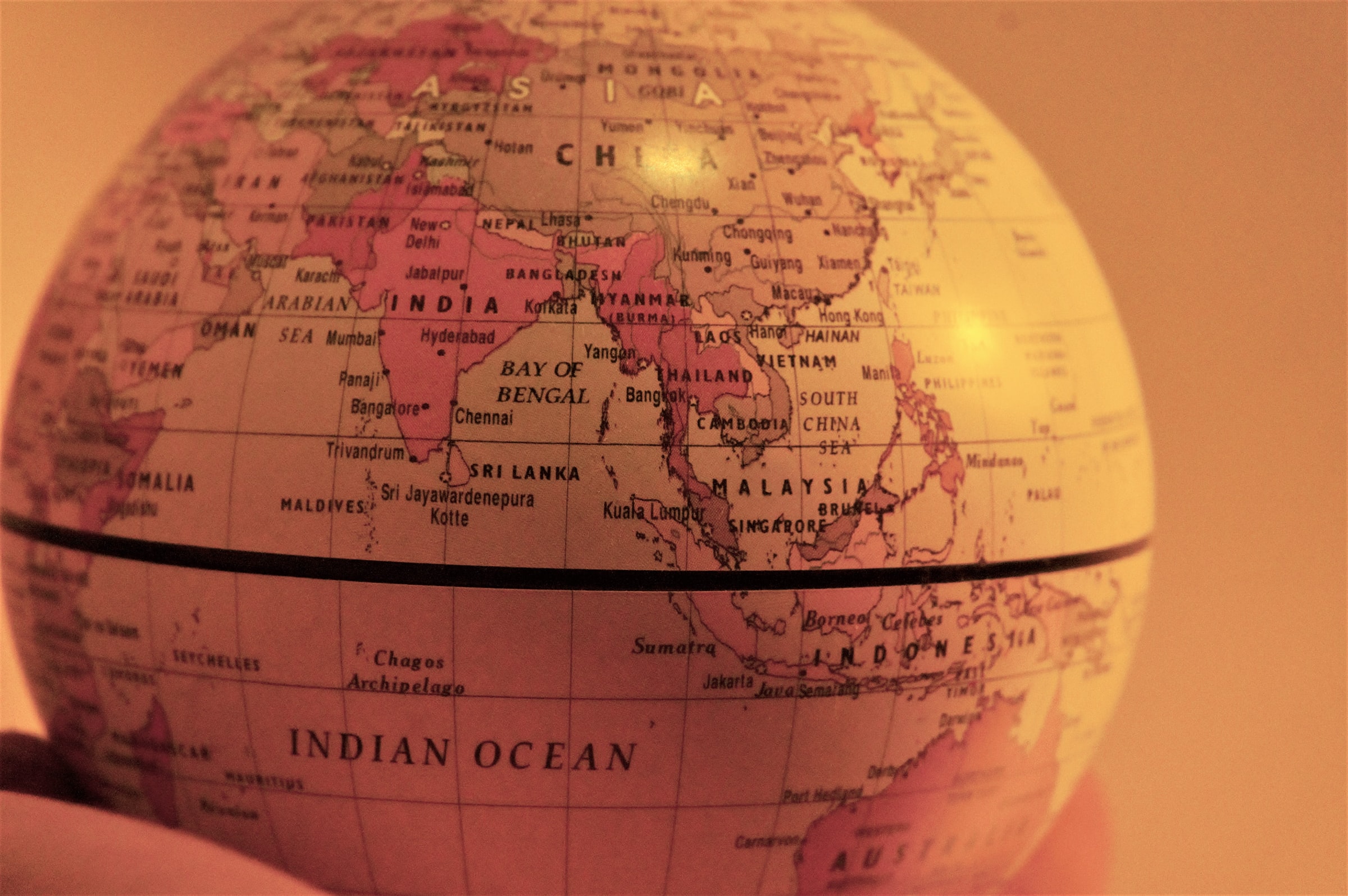An often overlooked security challenge in Asia has been the nexus between criminal enterprise and international terrorism that directly connects and impacts on both South Asia and Southeast Asia. It continues to fuel violence and instability. Here Dr. Sajjan Gohel (Asia-Pacific Foundation and LSE) and David Winston (Asia-Pacific Foundation, London) analyse the close connection between the organised criminal cartel the D-Company and its relationship with trans-national terrorist networks that connect two of Asia’s major regions.
The regions of South Asia and Southeast Asia have profound historical connections with well-worn paths for the movement of people and goods. These ties have facilitated the sharing and absorption of culture and religions. Both overland and maritime routes were used with efficacy for this purpose.
However, with the passage of time and the growth of jihadist extremism that stemmed from the Soviet Union invasion of Afghanistan, cross boundary linkages have become problematic and multifaceted. New alignments have come about between terrorist groups in South Asia and Southeast Asia, which was aided by criminal networks exploiting cross border and regional linkages, who now ensure the safe passage of terrorists from one region to the other.
The D-Company
Since the early 1990s, the criminal cog that links terrorism between South Asia and Southeast Asia has been the notorious D-Company, an organised criminal group, led by the drug kingpin and underworld boss Dawood Ibrahim, who remains in hiding in Pakistan. Ibrahim has earned the infamous tagline of ‘second richest criminal after fellow drug lord Pablo Escobar.’
The D-Company has been responsible for a significant amount of drug, human and weapons trafficking as well as extortion, counterfeit IDs and bribery throughout Asia that has contributed to fuelling terrorism and insecurity across the continent. The collaboration between the senior leadership in terrorist and criminal organisations that has proliferated in this region, courtesy of the D-Company, is profound. Many of these individuals have traits that would not look out of place in gangster movies, including eccentric aliases and nicknames.
Dawood Ibrahim’s D-Company was established in the late 1970s in Mumbai, India, where it cultivated conditions that were conducive to the rise of criminal enterprise. Following communal tensions in India between 1992 to 1993, D-Company smuggled in explosives and weapons from Karachi, Pakistan. On 12 March 1993, this arsenal was used in the Mumbai Bombings resulting in 13 bombings throughout the city, including at the stock exchange, resulting in 157 people dead and injuring over 700. Prior to these attacks, Ibrahim and his cohorts fled India and sought sanctuary in Pakistan. In 2005 his daughter married the son of Pakistani cricket legend Javed Miandad. The D-Company have been directly connected to international betting syndicate responsible for match-fixing spot-fixing in cricket matches.
Enter Jemaah Islamiyah
The Southeast Asian terrorist group, Jemaah Islamiyah (JI), at its peak had extensive ties with al-Qaeda, and assisted two of the 11 September 2001 hijackers. JI also orchestrated the 12 October 2002 bombing in Bali, Indonesia that killed 202 people, which included 88 Australians.
JI has had cells in Malaysia, Singapore, Indonesia, the Philippines, Thailand, and Pakistan. To achieve its goal of creating a caliphate in Southeast Asia, it formed alliances with other militant Islamist groups in Pakistan to share resources for training, arms procurement, financial assistance, and to promote cooperation in carrying out attacks. As a result, several senior JI members ended up in Pakistan.
Abbottabad
The Pakistani garrison town of Abbottabad will forever be synonymous as the last sanctuary of the al-Qaeda leader Osama bin Laden. However, he was not the only terrorist there. On 25 January 2011, Umar Patek, a senior member of the JI was found to be living in Abbottabad together with his wife. What makes the situation more bizarre is that Kakul Military Academy is situated in Abbottabad, and yet terrorists for many years found it to be a place of refuge.
Patek, who was a key coordinator for the 2002 Bali Bombings, had a $1 million bounty on his head and has been at the centre of a nine year international manhunt. He was later extradited to Indonesia, put on trial for the Bali bombings and given a 20 year sentence.
It was more than a coincidence that Patek was in Abbottabad at the same time as bin Laden. The town had been used as a safe location by al-Qaeda terrorists in the past. Abu Faraj al-Libbi, who, after the capture of 9/11 mastermind Khalid Sheikh Mohammed in Rawalpindi in March 2003, had stepped into his role as al-Qaeda operational planner, was based in Abbottabad on occasions in 2004.
Patek was able to provide Indonesian investigators who interviewed him with very valuable insight on the murky connections between al-Qaeda in Pakistan and its relationship with terrorists in Southeast Asia. Furthermore, he also explained that it was the D-Company that helped bring him from Indonesia to Pakistan as he was smuggled across through land and sea.
Karachi
Patek’s co-conspirator in the Bali bombing was Riduan Isamuddin (aka Hambali), JI’s most senior operations planner who is currently in U.S. detention after being captured in Thailand. Hambali’s brother Rusman Gunawan (aka Gun Gun), was ‘officially’ arrested in Karachi, Pakistan, on 20 September 2003. He was found in a safe house belonging to the D-Company, which is primarily based in the port city.
Gunawan originally came to Pakistan in 1999 to study on a scholarship offered to him by the Pakistani government of General Pervez Musharraf at Karachi’s Abu Bakar University. However, he soon became absorbed in JI’s activities and worked with Hambali to provide logistical support as the JI’s Pakistan regional head. In Karachi, Gunawan was part of the so-called al-Ghuraba (the foreigners) cell consisting of Indonesians with connections to JI leadership. Several travelled to Pakistan-Administered Kashmir where they received training from the Pakistani jihadist group Lashkar-e-Toiba (LeT), an affiliate of al-Qaeda. The LeT were behind the Mumbai Siege attacks in November 2008 which resulted in 166 people dead and several hundred injured.
Gunawan was extradited to Indonesia where he was sentenced in October 2004 to four years in prison for his involvement in transferring money to finance the 2003 Marriot Hotel bombing in Jakarta, Indonesia in which 12 people were killed and hundreds injured. The funds were transferred through the D-Company’s hawala networks which channel millions of dollars a day across Asia. Hawalas are informal banking channels which bypass international banking monitoring standards and therefore are unaccountable to nefarious activities. The D-Company have been one of the biggest utilizers of this in the region. In July 2019, the D-Company’s principle Hawala operator Ahmad Raza (aka Afroz Vadaria) was deported from the United Arab Emirates to India and arrested .
Criminal Enterprise
In September 2017, Iqbal Kaskar, Dawood Ibrahim’s brother who was extradited to India from the United Arab Emirates, alleged that the D-Company, using its Hawala networks, funded the controversial televangelist cleric Zakir Naik’s NGO Islamic Research Foundation (IRF). Zakir is based in Malaysia and has a reputation of making hate speeches as well as sexist and homophobic comments, all of which has resulted in him being banned in the United Kingdom, Canada and Australia.
The D-Company has invested in real estate in Malaysia and Thailand which has given Dawood Ibrahim access to Southeast Asia where his network has been accused of bribing law enforcement and the judiciary in order for his network’s illicit activities, including drug trafficking, to flourish. The U.S. Office of Foreign Assets Control (OFAC), a branch of the United States Department of the Treasury, sanctioned two of Ibrahim’s deputies, Mohammed Shakeel (aka Chhota Shakeel) and Ibrahim Memon (aka Tiger Memon) under the Foreign Narcotics Kingpin Designation Act, or “Kingpin Act”. According to the OFAC, they both smuggled heroin and hashish, which were brought from Afghanistan and Thailand and imported illegally into the United States and Western Europe.
As a result of this, gangland killings are not unusual in Thailand. Back in 2000, Chhota Shakil was accused by the Thai authorities for ordering a hit on Rajendra Sadashiv Nikhalje (aka Chhota Rajan), a former ally of D-Company member who fell out with Dawood Ibrahim. Chhota Rajan had been trying to keep a low profile in Bangkok following a crackdown on his illicit activities in Australia. In the attempt to kill Chhota Rajan in a drive-by shooting several by-standers were wounded. Those that live in a world of violence usually end that way – Chhota Shakil was eventually killed in a dispute with a Ukrainian gang in Karachi.
The Current Challenges
Southeast Asia and in particular Thailand, remains a major hub for the D-Company. One of its hit men, Sayyed Muzakkir Muddassar Hussain (aka Munna Jhingra), who worked with Chhota Shakil, was arrested in Bangkok and prosecuted for the shooting of Chhota Rajan as well as possession of weapons. Munna Jhingra, an Indian national, had entered Thailand on a fake Pakistani passport. Munna Jhingra’s father worked with Dawood Ibrahim in the 1970s when the D-Company began to spring roots in Mumbai. Munna Jhingra is also wanted in India on accusations of murder, extortion and illegal possession of weapons.
Ironically, Munna Jhingra has been in a major custody battle between India and Pakistan which has received very little attention. The situation has become deeply complicated after a Thai court initially ruled in August 2018 that Munna Jhingra is an Indian citizen and will be repatriated to India. However, in September 2019 a Thai court of appeal rescinded the previous decision and accusations have surfaced that Thai officials were bribed to change the decision. The D-Company has taken ruthless advantage of the weakening of Thailand’s judicial system. The National Anti-Corruption Commission has also been politicised by the military junta that took control of Thailand following the 2014 military coup. This has weakened transparency and partly explains why the D-Company chooses to operate in Thailand.
Amongst all these cases, there have been accusations that the D-Company could not exist in Pakistan without the tacit support of the notorious Inter-Services Intelligence Directorate (ISI). Just like with the LeT and the Jaish-e-Mohammed (JeM), the argument is that the ISI uses the D-Network as an asset to further its strategic interests within its realm of influence. However, the problem is that these relationships are never stable and can often rebound on the nation that thinks it has the situation under control. In the meantime, the D-Company continues to grow and proliferate and retain ties with terrorist groups. As long as that remains to be the case, that will only serve to destabilise the countries it operates in as well as having an impact on Europe, North America and Australia. It is incumbent upon all governments in South Asia and Southeast Asia where D-Company operates to prosecute individuals involved with the organisation and drive their operations out. Otherwise, D-company will bring about further insecurity and make these nations vulnerable to terrorist activity.
This article gives the views of the author, and not the position of the South Asia @ LSE blog, nor of the London School of Economics. Please read our comments policy before posting. Featured Photo: Security Camera. Credit: @srhhrbch, Unsplash.







